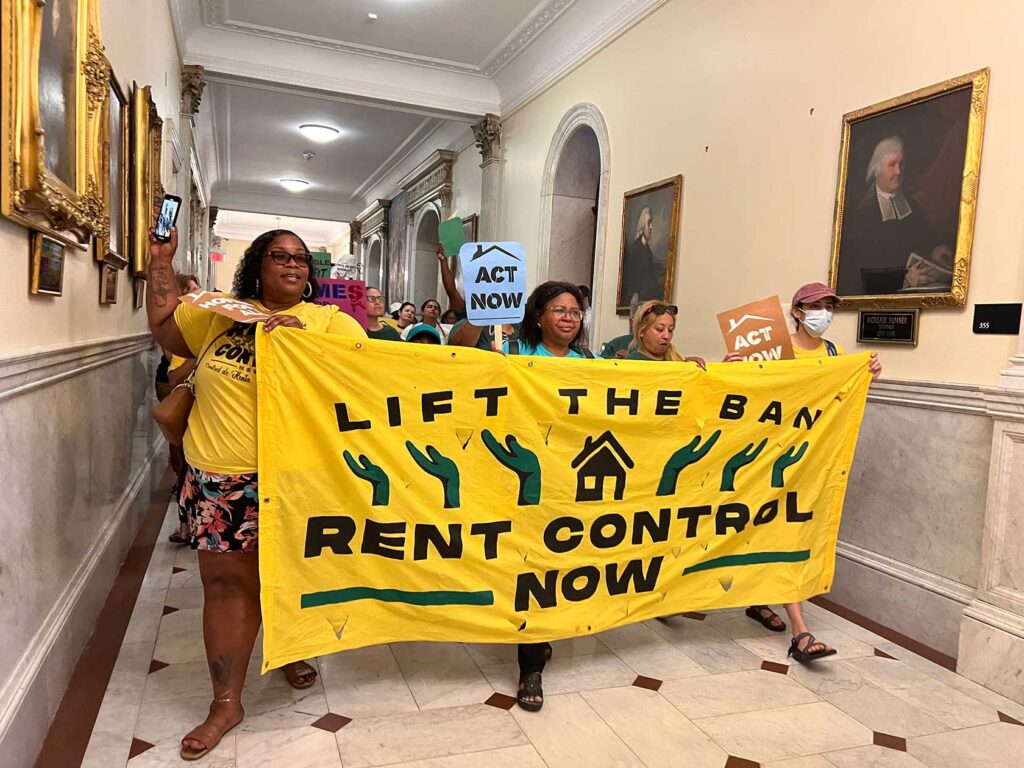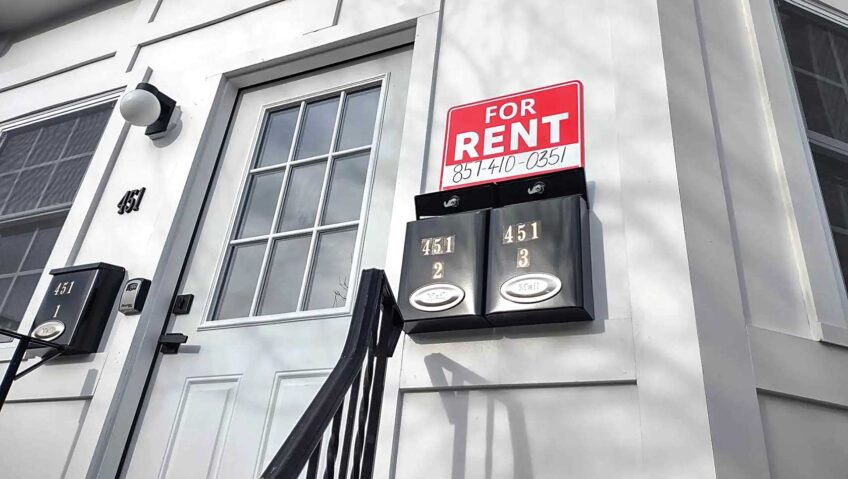Rent control advocates, opponents state their case during State House hearing

Advocates flocked to the State House, July 29, amid a renewed push to eliminate the statewide ban that prohibits cities and towns in Massachusetts from creating local rent control measures.
In a five-hour-long hearing before the Joint Committee on Municipalities and Regional Government, legislators heard from advocates speaking in support and opposition to the rent control bill, as well as other pieces of proposed legislation that would shift municipal approaches to housing, including proposed changes to the long-contentious MBTA Communities Act.
A new push to bring back rent control
Since the mid-1990s, rent control has been prohibited in Massachusetts.
The proposed legislation, if passed, would not directly implement rent control across Massachusetts, but would remove a 1994 ban for the measures, allowing municipalities to adopt rent control or rent stabilization measures.
“Lifting the statewide ban on rent control and stabilization would allow municipalities who are most impacted by the rising cost of housing and displacement to create their own path toward housing security for all families,” said Sen. Liz Miranda, during the hearing.
Under the bill, rent increases would be allowed at the rate of inflation, with a cap of 5% increases. The limit would continue across leases, so rents would not be able to be dramatically raised between tenants.
And the legislation includes other proposed tenant protections in the form of a ban on no-fault evictions, which would require landlords to provide “just cause” when trying to evict a tenant.
The bill bakes certain exemptions into its structure. Under the legislation, owner-occupied buildings with four units or less would be exempted, as would new housing for five years after its construction. Public and subsidized housing, college and university dorms and facilities for elder care would also fall outside of the law.
Rent control was banned in Massachusetts following a statewide ballot measure in 1994. At the time, three municipalities — Boston, Cambridge and Brookline — had rent control systems in place.
At the time, voters in those municipalities voted to uphold rent control, but statewide, pressures leaned the opposite direction and, overall, the state narrowly voted to eliminate and prohibit rent control in a decision that differed by less than three percentage points.
Locally the concept still seems to hold some appeal. In a July poll from Suffolk University and the Boston Globe, 65% of respondents said they favored a cap on rents or other forms of rent control.
And in 2021, when Boston voters last elected their mayor, Mayor Michelle Wu ran on a platform that included pushing the state to re-allow rent control.
Supporters of the bill framed the legislation, and the municipal policies it would allow, as one of multiple measures needed to address housing shortages in the state. A state housing needs assessment, published by the Executive Office of Housing and Livable Communities in February, found that between families in the state’s shelter system, a low vacancy rate for homes and apartments across Massachusetts and overcrowded homes, approximately 115,600 homes will be needed over the next 10 years to solve the existing shortage.
With a forecasted growing need, the state could require an estimated 222,000 homes total by 2035.
“Building new housing won’t keep rents from rising faster than people’s incomes,” said Sen. Pat Jehlen, lead sponsor of the bill in the Senate. “It won’t keep people from being evicted.”
Supporters also sought to draw a contrast between corporate landlords, who they framed as the culprits behind the large rent increases that rent control measures would seek to cap, and smaller landlords, some of whom would be exempted unto the local rent control measures allowed under the bill.
“We know that most landlords are able to not raise the rent more than the cost of living and they’re able to continue to pay what they need to,” said Carolyn Chou, executive director of Homes for All Massachusetts, a local organization that advocates housing and tenants’ rights. “This is really about corporate interests who are coming into cities and towns.”
The state’s housing need assessment identified larger landlords with profit-driven investors as more likely to maximize rents, take quick action to evict renters falling behind on payments and make quick investments to “flip” properties for short-term gains.
And some smaller landlords who spoke during the hearing said they believe rent stabilization policies can improve trust between landlords and tenants, and rent control can result in more stability with less abuse.
“I believe the landlord-tenant relationship should be good. This ensures better care for our properties, and it leads to better stabilities for our families,” said one small landlord with five units in Lynn through a translator. “That helps both parties equally.”
Opponents of the bill said they worry that rent stabilization policies will drive good landlords out of the market.
“We need more conscientious housing providers, not fewer, but this policy drives them out of the market,” said one small landlord who spoke during the hearing.
Opponents also cited other arguments against the policy, like concerns that it could drive prices higher in the long-term or lead to disinvestment in properties.
But supporters argued it was just one tool in the toolbox, and one that could be brought into play more quickly than growing the state’s housing stock.
“This is truly a crisis, and we have to do something now,” Miranda said.
Seeking change on the MBTA Communities Act
During the legislative hearing, advocates and lawmakers also turned their focus to proposed legislation focused on making adjustments to the MBTA Communities Act.
That 2021 law requires municipalities that touch the MBTA system, or the communities adjacent to them, to establish an area where multifamily housing is allowed by default or zoned by right.
Overall, it impacts 177 cities and towns across eastern Massachusetts.
Supporters of that law, including Gov. Maura Healey, have said the act makes it possible for more residents to find a home that’s accessible by transit, but it has proved contentious.
Municipalities have opted not to create the zoning plan required under the law — making them ineligible for certain kinds of state funding — and pushed back in other ways. Following the town of Milton’s refusal to adopt the zoning requirements under the law, in 2024, the attorney general’s office sued the town, which is bordered on its northern end by the Mattapan Trolley. Milton argued the attorney general’s office couldn’t enforce the law and lodged allegations that the MBTA Communities Act was unconstitutional.
In January, the Massachusetts Supreme Judicial Court ruled that the state had to redo its guidelines around the law, but that the measure was both constitutional and enforceable.
The Joint Committee on Municipalities and Regional Government heard testimony about a handful of bills that would make changes to the MBTA Communities Act, largely to restrict its reach, taking steps from creating exemptions based on size or existing housing stock to repealing the law altogether.
Another proposed bill would move in the opposite direction, expanding the requirements for multi-family zoning to all communities across Massachusetts.
Advocates for changes to the MBTA Communities Act largely hung their arguments in opposition to what they described as a “one-size-fits-all” mandate.
“The one-size-fits-all approach really doesn’t work and hasn’t worked in the history of the state,” said Sen. Patrick O’Connor, speaking on a bill that would allow for exemptions for adjacent communities, and another that would create an appeals process that would allow municipalities to object based on factors around drinking water supply, wastewater treatment, transportation impacts and environmental or historical impacts.
“I think we need to give more options to our communities who are struggling to meet the MBTA Communities Law,” O’Connor said.







Leave a Reply
You must be logged in to post a comment.